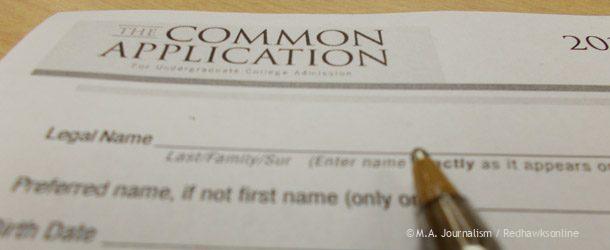Graduation season brings a new group of students to a familiar stage: applying to college
This advice from experts can smooth the path
College may be a stressful time for anyone from the prospective student to the parent providing financial assistance for their child. With acceptance rates dropping as low as 4.8 percent at Stanford University, the stress is not unfounded.
“I’m most nervous about having to make decisions about where I’m going to apply to and how much time the process is going to take with the other classes I’m taking and extracurriculars,” junior Grace Kirkpatrick explained about her concerns for next year.
A concern that high school students hold when applying to college is whether or not a school is “right” for them.
With an increasingly competitive application process and so many colleges to choose from, this can be a big issue.
“The main thing to look for is a good fit,” said Mark Klassen, an art professor at Beloit College. “Some people may want an all-art academy, or maybe a school that excels in an area of athletics. Others looking for a graduate program or an advanced degree would be good at a liberal arts school and get a broad education there.”
To decide whether or not a college is a good fit, it is important to narrow down the options by asking questions.
“[Some] criteria to look at is: Do you want to be in state or out of state?” said Minnehaha college and guidance counselor Kristin Overton.
“Do you want to be at a large school or a small school?” Overton said. “Do they have extracurriculars that are interesting to you? What types of scholarships and financial aid do they offer? Is it affordable? Once you can break it down into categories like that, it helps it to seem less overwhelming and more manageable.”
Many students look for a college with a welcoming environment. “I chose [Gustavus Adolphus] because I really liked the community there and immediately felt at home,” senior Sophie Olson said.
One of the most important factors submitted in the college application is a resume.
“Really anything and everything [should be put on resumes],” said Overton. “Things that are great to put on there are any leadership opportunities you’ve had, sports that you’ve played, fine arts you’ve participated in, any clubs or organizations you’ve been a part of…any volunteer work you’ve done, academic awards you’ve been given.”
According to Leora Johnson, Assistant Director of Alumni Interviewing at Brown University, the best information to put on a resume are things you excel at and that colleges look for students that are interested in a certain field.
“[Some good things to put on a resume] are some of the basics in terms of your education and your experiences and things students are doing outside of class,” said Johnson.
Another concern students have about college applications is the timing for when to begin preparations for college. “The earlier you can start that resume, even in ninth grade, the better,” said Overton. “If you can start it early and kind of work as you go, it doesn’t become so overwhelming to put together.”
Many students also believe that getting a head start decreases stress.
“Applying early decreased the stress more than anything, as I was able to go into senior year already accepted into my top school,” said senior Madeleine Debele.
Another way to prepare is to focus on learning and schoolwork during freshman and sophomore years.
“In the earlier stages of high school, in ninth and tenth grade, it’s really learning to learn and not get so focused on college quite yet,” said Johnson.
“But really enjoying your course work,” Johnson continued, “taking challenging classes and taking a breadth of courses to expose yourself to different areas of study, and just getting comfortable as a student. I think students get really stressed out really easily in ninth and tenth grade when you don’t have to yet, and it’s really more about learning and putting your heart into what you’re doing.”
Some of the most successful students are the ones who are able to push through and enjoy the process.
“As you transition into junior and senior year and you are starting to look at schools, don’t forget about learning, developing your skills and enjoying your experience and challenging yourself for the sake of growing as a person and as a student,” said Johnson.
Though college can be intimidating, one may be confident and open to learning new things about the world and themselves.
“I’m not really nervous at this point, I’m just looking forward to a new phase of life,” said Olson.
“Going to Minnehaha has definitely prepared me for college with the rigor of courses here as well as giving me the support system I need to feel comfortable moving on to college,” she said. “What I’ll miss most about Minnehaha is definitely the people here, both teachers and other students. I’ll definitely miss being around all that good energy.”

